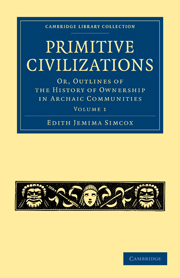Book contents
- Frontmatter
- PREFACE
- Contents
- CHAPTER 1 INTRODUCTION
- CHAPTER II PREHISTORIC PROBLEMS
- BOOK I OWNERSHIP IN EGYPT
- BOOK II ANCIENT BABYLONIA
- BOOK III FROM MASSALIA TO MALABAR
- FROM MASSALIA TO MALABAR
- CHAPTER I THE PHŒNICIANS AND CARTHAGE
- CHAPTER II PREHISTORIC POPULATIONS OF ASIA MINOR, GREECE, AND ITALY
- CHAPTER III THE ETRUSCANS, LYCIANS, AND RHODIANS
- CHAPTER IV THE LAWS OF CHARONDAS
- CHAPTER V LEGENDARY AMAZONS AND HISTORICAL IBERIANS
- CHAPTER VI CRETE AND SPARTA
- CHAPTER VII A SYRIAN LAW-BOOK
- CHAPTER VIII ANCIENT ARABIA
- CHAPTER IX HAMITIC AFRICAN TRIBES
CHAPTER III - THE ETRUSCANS, LYCIANS, AND RHODIANS
Published online by Cambridge University Press: 07 September 2011
- Frontmatter
- PREFACE
- Contents
- CHAPTER 1 INTRODUCTION
- CHAPTER II PREHISTORIC PROBLEMS
- BOOK I OWNERSHIP IN EGYPT
- BOOK II ANCIENT BABYLONIA
- BOOK III FROM MASSALIA TO MALABAR
- FROM MASSALIA TO MALABAR
- CHAPTER I THE PHŒNICIANS AND CARTHAGE
- CHAPTER II PREHISTORIC POPULATIONS OF ASIA MINOR, GREECE, AND ITALY
- CHAPTER III THE ETRUSCANS, LYCIANS, AND RHODIANS
- CHAPTER IV THE LAWS OF CHARONDAS
- CHAPTER V LEGENDARY AMAZONS AND HISTORICAL IBERIANS
- CHAPTER VI CRETE AND SPARTA
- CHAPTER VII A SYRIAN LAW-BOOK
- CHAPTER VIII ANCIENT ARABIA
- CHAPTER IX HAMITIC AFRICAN TRIBES
Summary
There will be little difference of opinion as to the place of the Etruscans, the Lycians, and the Iberians of Spain and the Caucasus in a sketch of pre-Hellenic custom; and as to the less well-known nations of Asia Minor, Hellenic influence is not taken for granted without positive evidence. The case is different if we venture to suggest that the settlements in Greece and Italy, which were most famous for their laws and customs, may have inherited the latter from the same pre-Hellenic population; and that, in fact, the laws ascribed to Charondas, Lycurgus, and Minos were not originally promulgated in Greek; or that the seven sages of proverbial fame may have been mainly of barbarian parentage. It will be prudent to stop short at the contention that the legendary law-givers were admired by the Greeks of history, as men admire exotic rather than home-grown wisdom; and that much which was strange to the average Greek would have appeared natural and matter of course to the earlier stock.
THE ETRUSCANS.
With regard to the origin of the Etruscans, the received view of the ancients from Herodotus to Strabo, makes them an offshoot from the Lydian people, and therefore, at one time, natives of Asia Minor. “Lydian” and “Etruscan” were used almost as convertible terms to describe the luxurious garments used and sold in Etruria; and the general acceptance of, what Mommsen calls, “ one of the most unhappy complications of historical tradition,” must have been favoured by general superficial likeness between the later culture of the two regions.
- Type
- Chapter
- Information
- Primitive CivilizationsOr, Outlines of the History of Ownership in Archaic Communities, pp. 425 - 444Publisher: Cambridge University PressPrint publication year: 2010First published in: 1894

